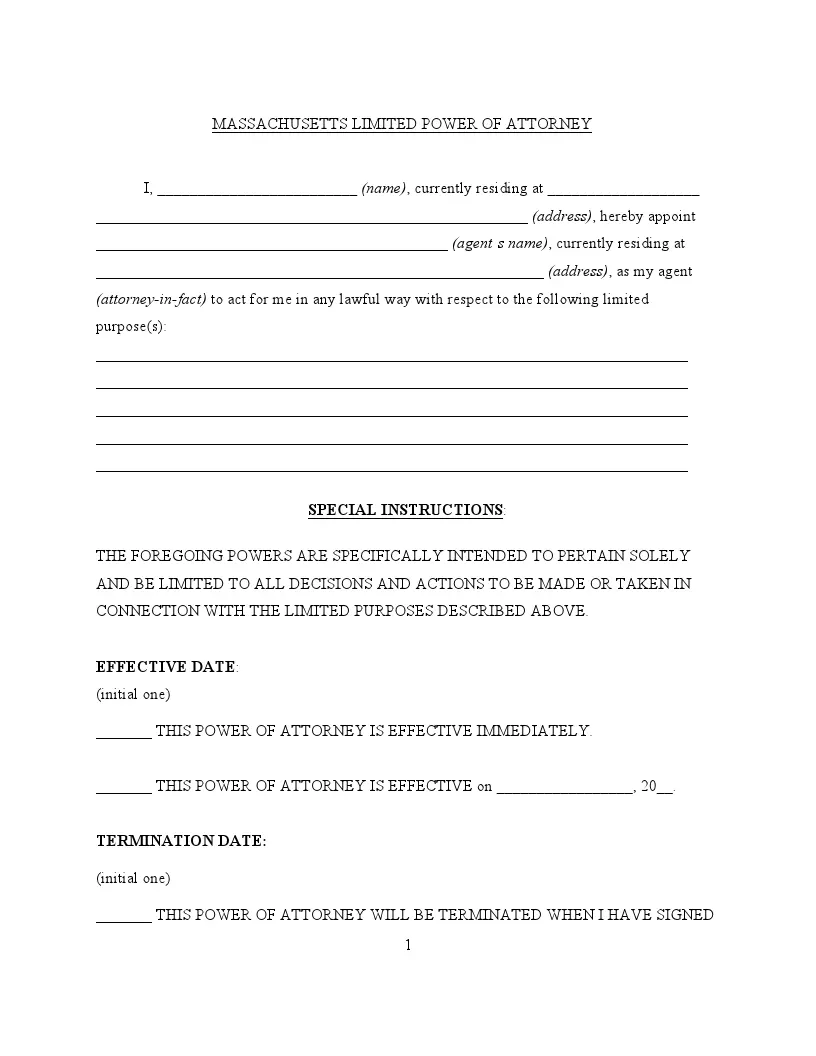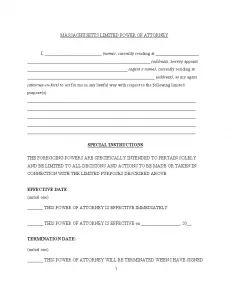Massachusetts Limited Power of Attorney Form
The Massachusetts limited power of attorney is a legal instrument that authorizes a chosen individual, the agent or attorney-in-fact, to represent another person, called the principal, in designated affairs or transactions. This form is termed “limited” as it confines the agent’s authority to specific tasks, contrasting with a general power of attorney, which grants extensive control over the principal’s overall matters.
A limited power of attorney is used to manage specific tasks such as real estate transactions, financial management, or healthcare decisions strictly according to the guidelines detailed in the document. Unless otherwise specified, it typically takes effect when signed and can be established as durable. This means the Massachusetts power of attorney forms remain valid even if the principal becomes incapacitated as long as the document explicitly mentions this condition.

Build Your Document
Answer a few simple questions to make your document in minutes
Save and Print
Save progress and finish on any device, download and print anytime
Sign and Use
Your valid, lawyer-approved document is ready
In Massachusetts, the creation and execution of a Limited Power of Attorney are governed by specific legal standards to ensure its validity and enforceability. The pertinent laws are outlined in the General Laws of Massachusetts, Chapter 190B, Article V, Sections 5-501 to 5-507. Additionally, current Bill H.1598, An Act Relative to the Uniform Power of Attorney Act, also helps to standardize the rules and expectations surrounding POA in Massachusetts.
Signing requirements for a limited power of attorney in Massachusetts include:
- The acknowledgment of two witnesses;
- Notarization is highly recommended to strengthen the document’s legal standing.
Furthermore, if the principal decides to revoke the power of attorney, Massachusetts law mandates that written notice be provided as specified in Section 5-504. This formal process is crucial for legally terminating the powers granted to the attorney-in-fact, thereby safeguarding the principal’s interests.
Massachusetts Limited Power of Attorney Form Details
| Document Name | Massachusetts Limited Power of Attorney Form |
| Other Name | Massachusetts Special Power of Attorney |
| Relevant Laws | General Laws of Massachusetts, Section 5-501 |
| Avg. Time to Fill Out | 8 minutes |
| # of Fillable Fields | 32 |
| Available Formats | Adobe PDF |
Filling Out Massachusetts Limited POA
Here’s a guide on how to fill out a Massachusetts limited power of attorney form. Ensure all information is accurately stated to create a document that meets your needs and adheres to state legal requirements.
1. Enter Your Full Name and Address
Begin the form by writing your full legal name where indicated. Following this, provide your complete address, including city, state, and zip code. Ensure that the name and address match your identification documents to avoid discrepancies.
2. Appoint Your Attorney-in-Fact
In the designated space, write the full name of the person you appoint as your attorney-in-fact. This individual will have the authority to act on your behalf as specified in the document. Choose someone you trust, as they will be acting in your legal capacity for the matters outlined.
3. Define the Powers Granted
Specify the powers you are granting to your attorney-in-fact. This should be detailed in the sections that list the specific acts they are authorized to perform. Be as clear and precise as possible to avoid any potential confusion or misuse of the power granted.
4. Set the Duration
If the document does not specify, you may need to state how long the limited POA will remain in effect. This could be until a specific date, upon completion of the tasks, or until you revoke it in writing.
5. Sign and Date the Form
Once all parts of the form are completed, sign and date it in the presence of witnesses. The date should include the day, month, and year you execute the document.
6. Witness Signatures
Massachusetts law requires the limited POA to be acknowledged by two witnesses. These witnesses must watch you sign the document and provide their signatures and addresses on the form. Choose individuals who are not named as attorneys-in-fact and who do not stand to benefit from the POA.
7. Notarization (Optional but Recommended)
While not always mandatory, notarizing the document with a notary public is recommended. This step lends additional legal weight to the document and can help prevent challenges regarding its authenticity.
8. Keep Copies
After completing the form, make several copies. Provide one to your attorney-in-fact, keep one for yourself, and consider giving another to a trusted advisor such as a lawyer or family member.
